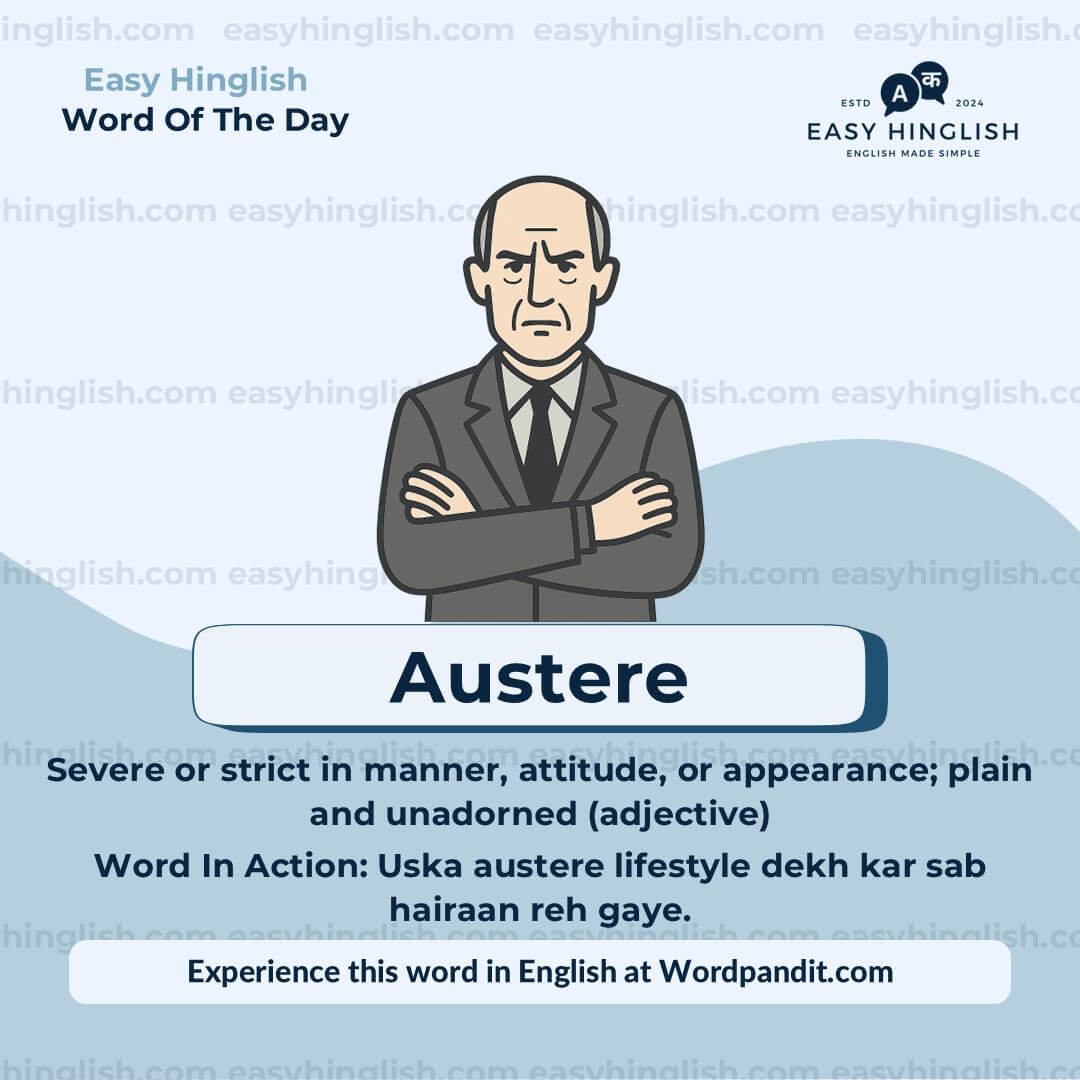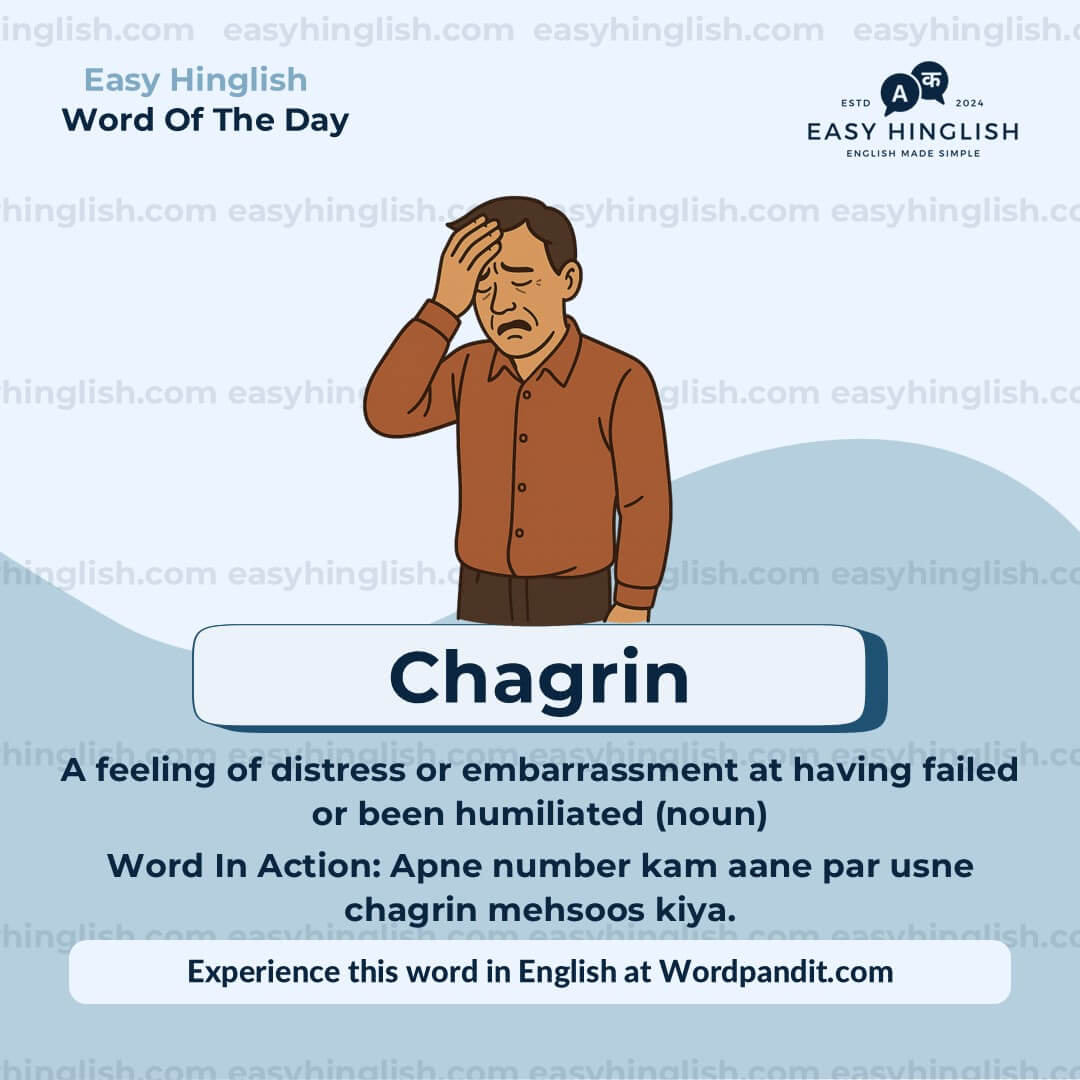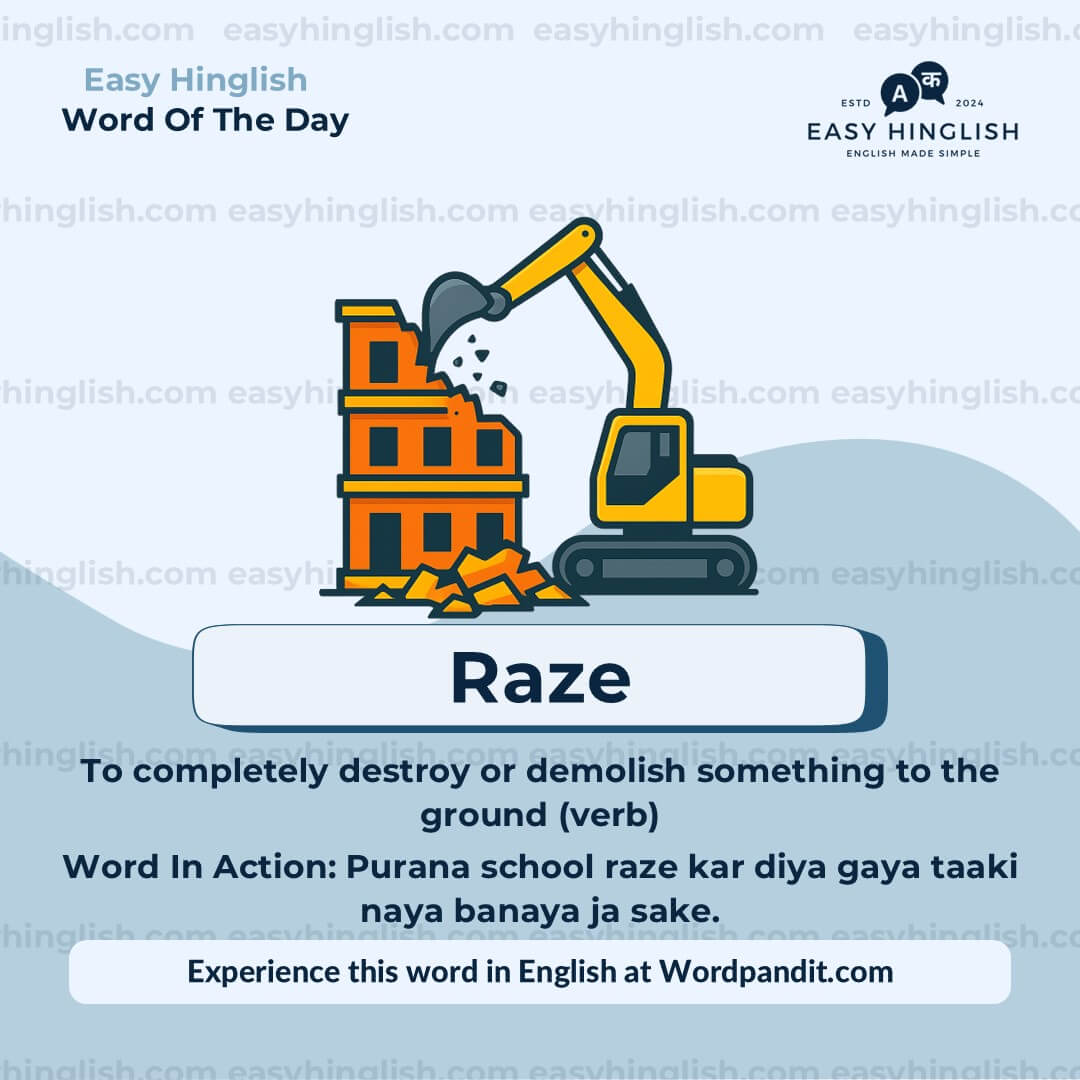Daily Vocabulary Indian Newspapers aur Publications se Seekho
Welcome to Wordpandit ka Indian Vocabulary Hub
Wordpandit par, hum samajhte hain ki ek achhi vocabulary develop karne ke liye local context samajhna bhi zaroori hai. Is section ka focus hai aapke vocabulary ko India ke leading newspapers aur publications se naye shabdon aur phrases ke zariye improve karna, taaki aap practical, relevant, aur uniquely Indian words seekh sakein.
Indian Sources Itne Important Kyun Hain?
Hum maante hain ki kisi bhi language ko sikhne ka sabse best tareeka hai uske local content me immerse hona. Isi wajah se hum carefully words curate karte hain top Indian newspapers aur publications se, jaise:
- The Hindu
- The Times of India
- The Economic Times
- Hindustan Times
- Live Mint
- The Indian Express
- Aur bhi bahut saare...
Hamesha Updated Raho, Hamesha Relevant Raho
Daily updates ke saath, aap Indian news sources se naye words seekhoge jo Indian society aur culture ke latest trends ko reflect karte hain. Hamara focus hai aise words provide karna jo aapke liye real-world me useful ho.
Wordpandit Aapke Learning Goals Ko Kaise Support Karta Hai?
Chahe aap exams ki preparation kar rahe ho, professional communication improve karna chahte ho, ya sirf naye words seekhna chahte ho, Wordpandit har step par aapki madad karega.
Practical Tareeke Se Seekho
Hamari interactive learning methodology me real-world examples, engaging activities, aur context-based usage shamil hain, taaki har naya shabd aapki active vocabulary ka hissa ban sake.
Aaj Hi Indian Vocabulary Seekhna Shuru Karo!
Wordpandit Kyun Choose Karein?
Practical Learning: Aise words seekho jo aapko real-world reading aur communication me sach me kaam aayenge, taaki aapki comprehension aur bolne ki skills improve ho.
Diverse Content: Current affairs se lekar scientific breakthroughs tak, hamare different sources aapko multiple domains ka vocabulary sikhate hain.
Effortless Integration: Wordpandit ko apni daily routine ka part banao. Sirf kuch minute har din dene se aapki vocabulary time ke saath kaafi improve ho sakti hai.
Aapka Vocabulary Mastery Tak Ka Safar
- Regularly hamare Daily Vocabulary section ko visit karo
- Naye words explore karo aur unka context me use samjho
- In words ko apni writing aur bolne ki practice me use karne ki koshish karo
- Jaise-jaise aapke words badhte hain, apni progress ko track karo
Aaj Se Apni Vocabulary Journey Shuru Karo!
Wordpandit ke saath vocabulary improve karna start karo. Roz thoda effort dalne se aap ek strong vocabulary develop kar sakte ho jo academic, professional, aur personal life me kaafi kaam aayegi.
Yaad rakho, ek naya shabd roz seekhna linguistic limitations ko door karne ka best tareeka hai! Wordpandit ko apni daily learning journey ka sathi banao aur vocabulary excellence ki taraf badho!
WORD-1: Beget
Context:
"Violence only begets more violence, creating a cycle that is hard to break." - The Atlantic
Explanatory Paragraph:
“Beget” is a somewhat formal or old-fashioned word that means to cause or produce something, often something abstract like an idea, emotion, or result. It can also literally mean to father a child, but in modern usage, it’s more commonly used metaphorically to express the origin of an event or chain of events. For instance, anger can beget resentment, and kindness can beget trust.
Meaning: To cause or produce; to bring about or give rise to (verb)
Pronunciation: bih-GET
Difficulty Level: ⭐⭐⭐ Intermediate
Etymology: From Old English “begietan,” meaning to get or acquire; influenced by Old Norse and Middle English usage related to generation or production.
Prashant Sir's Notes:
Beget is a key academic and literary word. Always remember its association with cause-effect chains. Whenever you see something triggering another action or emotion, mentally try to frame it using “beget.”
Synonyms & Antonyms:
Synonyms: generate, cause, produce, induce, engender, create
Antonyms: halt, prevent, suppress, stop
Usage Examples:
- Fear often begets suspicion and hostility in uncertain times.
- The policies implemented during the crisis only begot further unrest.
- Kindness can beget kindness, creating a ripple effect of goodwill.
- Great art often begets deep reflection and emotional resonance.
Cultural Reference:
"For whatsoever a man soweth, that shall he also reap." — Galatians 6:7, often interpreted in literature to mean that actions beget consequences. - The Bible
Think About It:
Can one small action truly beget a series of life-changing events? How does this idea show up in stories or history?
Quick Activity:
Write down three abstract concepts (like trust, fear, creativity) and describe one thing that could beget each of them.
Memory Tip:
Think of "beget" as "begin to get" something — like one thing starting or causing another to happen.
Real-World Application:
Understanding "beget" helps in discussing complex social issues, such as how poverty can beget crime, or how innovation begets progress in technology and society.
WORD-2: Austere
Context:
"The room was austere, with bare walls, a simple wooden bed, and no decoration whatsoever." - The Guardian
Explanatory Paragraph:
“Austere” describes something that is very simple, plain, or strict—often to the point of seeming harsh or severe. It can refer to a lifestyle, a person’s manner, an appearance, or even a design. Someone who leads an austere life avoids luxury or excess, while an austere environment might lack color, comfort, or decoration. The word often carries connotations of discipline, seriousness, and self-restraint.
Meaning: Severe or strict in manner, attitude, or appearance; plain and unadorned (adjective)
Pronunciation: aw-STEER
Difficulty Level: ⭐⭐⭐⭐ Upper-Intermediate
Etymology: From Latin “austerus” and Greek “austēros,” meaning harsh or severe.
Prashant Sir's Notes:
Remember “austere” as the opposite of “lavish.” Think of a minimalist or monk-like lifestyle. It’s often used in literature to depict simplicity with discipline or even emotional coldness.
Synonyms & Antonyms:
Synonyms: strict, severe, plain, harsh, spartan, restrained
Antonyms: luxurious, indulgent, elaborate, ornate, lenient
Usage Examples:
- The monk lived an austere life, devoid of material possessions.
- Her austere tone silenced the room instantly.
- The architect chose an austere design, focusing on clean lines and empty space.
- Economic austerity measures forced the government to cut social programs.
Cultural Reference:
"Austerity" became a global buzzword during the 2008 financial crisis, as several European countries implemented austere economic policies to reduce debt. - BBC News
Think About It:
Can adopting an austere lifestyle bring more clarity and peace, or does it limit the joys of living? Where’s the balance?
Quick Activity:
Look around your room or workspace. What items would you remove to make the space more “austere”? Why?
Memory Tip:
Think “austere” = “stern” + “bare.” Both hint at strictness and simplicity.
Real-World Application:
In professional settings, an austere tone or appearance can convey seriousness and discipline—useful in negotiations, formal writing, or interviews. In design, it often reflects a minimalist aesthetic.
WORD-3: Chagrin
Context:
"Much to his chagrin, his idea was rejected without consideration." - The Washington Post
Explanatory Paragraph:
“Chagrin” refers to a feeling of deep disappointment, humiliation, or annoyance caused by failure or frustration. It’s that sinking feeling you get when something doesn’t go your way, especially when your pride is hurt. It’s often used to describe emotional discomfort that arises when one’s expectations are unmet in a particularly personal or public way.
Meaning: A feeling of distress or embarrassment at having failed or been humiliated (noun)
Pronunciation: shuh-GRIN
Difficulty Level: ⭐⭐⭐ Intermediate
Etymology: From French “chagrin,” meaning sorrow or grief; possibly derived from a Turkish word for “rough skin,” symbolizing discomfort.
Prashant Sir's Notes:
Chagrin is emotional discomfort mixed with embarrassment. It’s more refined than just “sadness”—there’s a sting of pride involved. Connect it with social or professional letdowns.
Synonyms & Antonyms:
Synonyms: embarrassment, humiliation, disappointment, dismay, vexation
Antonyms: delight, satisfaction, pride, pleasure
Usage Examples:
- To her chagrin, the promotion was given to someone less experienced.
- He smiled awkwardly, trying to hide his chagrin after the public mistake.
- Much to my chagrin, the audience didn’t respond to my presentation.
- She was filled with chagrin when her assumptions were proven wrong.
Cultural Reference:
In Jane Austen's *Pride and Prejudice*, Mr. Darcy often experiences internal chagrin as his pride clashes with his affection for Elizabeth—capturing a timeless emotional struggle. - Literary Analysis
Think About It:
Is chagrin a useful emotion that pushes us to grow, or is it just pride in disguise?
Quick Activity:
Recall a time when something didn't go as planned and you felt embarrassed or disappointed. Write a sentence about it using “chagrin.”
Memory Tip:
Imagine your grin (“grin”) turning into a frown due to failure—“cha(grin)” = a grin disrupted by humiliation.
Real-World Application:
Understanding “chagrin” helps articulate complex emotional experiences, especially in professional feedback, storytelling, or personal reflection, where emotional nuance is important.
WORD-4: Deride
Context:
"Critics were quick to deride the proposal, calling it naive and unrealistic." - The New York Times
Explanatory Paragraph:
“Deride” means to mock, ridicule, or laugh at someone or something in a scornful or contemptuous way. When someone derides an idea, person, or action, they are not just disagreeing—they are putting it down with sarcasm, disdain, or outright hostility. It’s a strong word that suggests a lack of respect and can often escalate conflict, especially in debates or social commentary.
Meaning: To ridicule or mock someone or something (verb)
Pronunciation: dih-RIDE
Difficulty Level: ⭐⭐⭐ Intermediate
Etymology: From Latin “deridere” – ‘to laugh at,’ from “de-” (down) + “ridere” (to laugh)
Prashant Sir's Notes:
Always associate “deride” with disrespectful laughter or dismissive comments. It’s sharper than mere criticism—it’s sneering. Use it for situations involving sarcasm or belittlement.
Synonyms & Antonyms:
Synonyms: mock, ridicule, scorn, sneer, jeer, taunt
Antonyms: praise, compliment, respect, admire, endorse
Usage Examples:
- They derided his optimism as naïve and disconnected from reality.
- The satirical cartoon derided the politician’s contradictory statements.
- She was hurt when her classmates derided her science project.
- Internet trolls often deride public figures for trivial reasons.
Cultural Reference:
Comedians like Jon Stewart and Trevor Noah often use satire to deride political hypocrisy and social absurdities. - The Daily Show
Think About It:
Is derision ever justified, or does it always cross the line from critique into cruelty?
Quick Activity:
Write a short dialogue where one character derides another’s idea. Then rewrite it using constructive criticism instead.
Memory Tip:
Think “de-RIDE” as riding someone down with words—like verbally trampling their ideas.
Real-World Application:
In debates, media, or leadership, understanding when someone is being derisive helps you distinguish between helpful feedback and harmful mockery—crucial in emotional intelligence and conflict resolution.
WORD-5: Raze
Context:
"The city council voted to raze the abandoned building to make room for a new community park." - NPR
Explanatory Paragraph:
“Raze” is a powerful verb that means to completely destroy or demolish something, typically a building or structure. It implies flattening to the ground, leaving nothing standing. Often used in urban development, warfare, or natural disaster contexts, “raze” conveys total and often deliberate obliteration. It’s important not to confuse it with “raise,” which sounds the same but means the opposite (to lift up).
Meaning: To completely destroy or demolish something to the ground (verb)
Pronunciation: rayz
Difficulty Level: ⭐⭐⭐ Intermediate
Etymology: From Middle English “rasen,” derived from Old French “raser,” meaning ‘to scrape’ or ‘shave’—implying complete removal.
Prashant Sir's Notes:
This word is commonly confused with “raise.” Always link “raze” with destruction—if it’s being razed, it’s being erased. Use it when discussing total demolition, whether physical or metaphorical.
Synonyms & Antonyms:
Synonyms: demolish, destroy, flatten, obliterate, level, tear down
Antonyms: build, construct, erect, raise, restore
Usage Examples:
- The hurricane razed several coastal towns, leaving only debris.
- They plan to raze the outdated stadium and build a modern complex.
- The invading army razed the ancient city as a show of dominance.
- After the fire, the damaged building had to be razed for safety reasons.
Cultural Reference:
In 1945, much of Dresden, Germany was razed by Allied bombing during World War II—a controversial and devastating moment in history. - Smithsonian Magazine
Think About It:
Is it always necessary to raze the old to make way for the new? What are the cultural or emotional costs of demolition?
Quick Activity:
Find a photo of an old structure (online or near you) and write a sentence about what would happen if it were razed. How would the community feel?
Memory Tip:
Raze = Erase. Just one letter apart, both mean to remove completely.
Real-World Application:
Understanding “raze” is useful in discussions around urban planning, history, natural disasters, or even metaphorical change—like “razing outdated policies” to create better systems.













